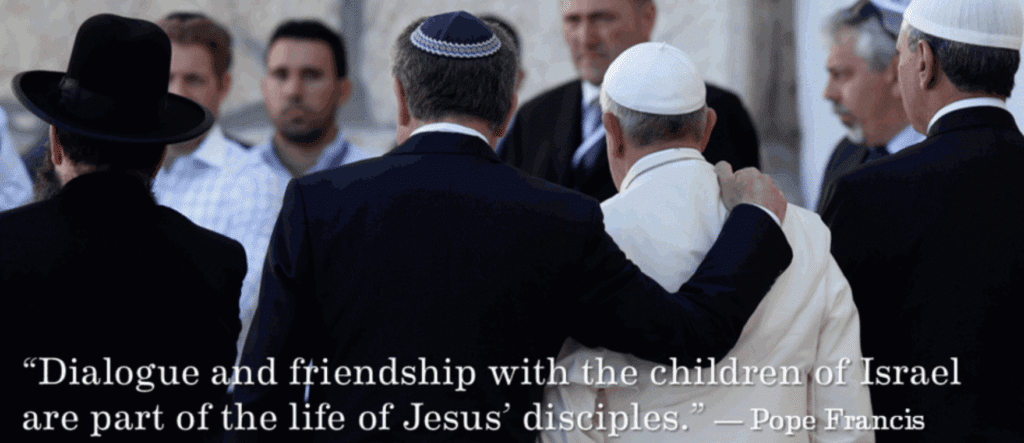Search Posts
Recent Posts
- Real Estate in RI: Seaside waterfront communities are all the rage. Who’s buying – Emilio DiSpirito June 6, 2025
- Outdoors in RI: 2A votes, Charter Yachts, active summer programs, garden tours, aquatic weeds… June 6, 2025
- All About Home Care, with two Rhode Island locations, closing after 22 years in business June 6, 2025
- GriefSPEAK: Angel wings with footprints – Mari Nardolillo Dias June 6, 2025
- Rhode Island Weather for June 6, 2025 – Jack Donnelly June 6, 2025
Categories
Subscribe!
Thanks for subscribing! Please check your email for further instructions.
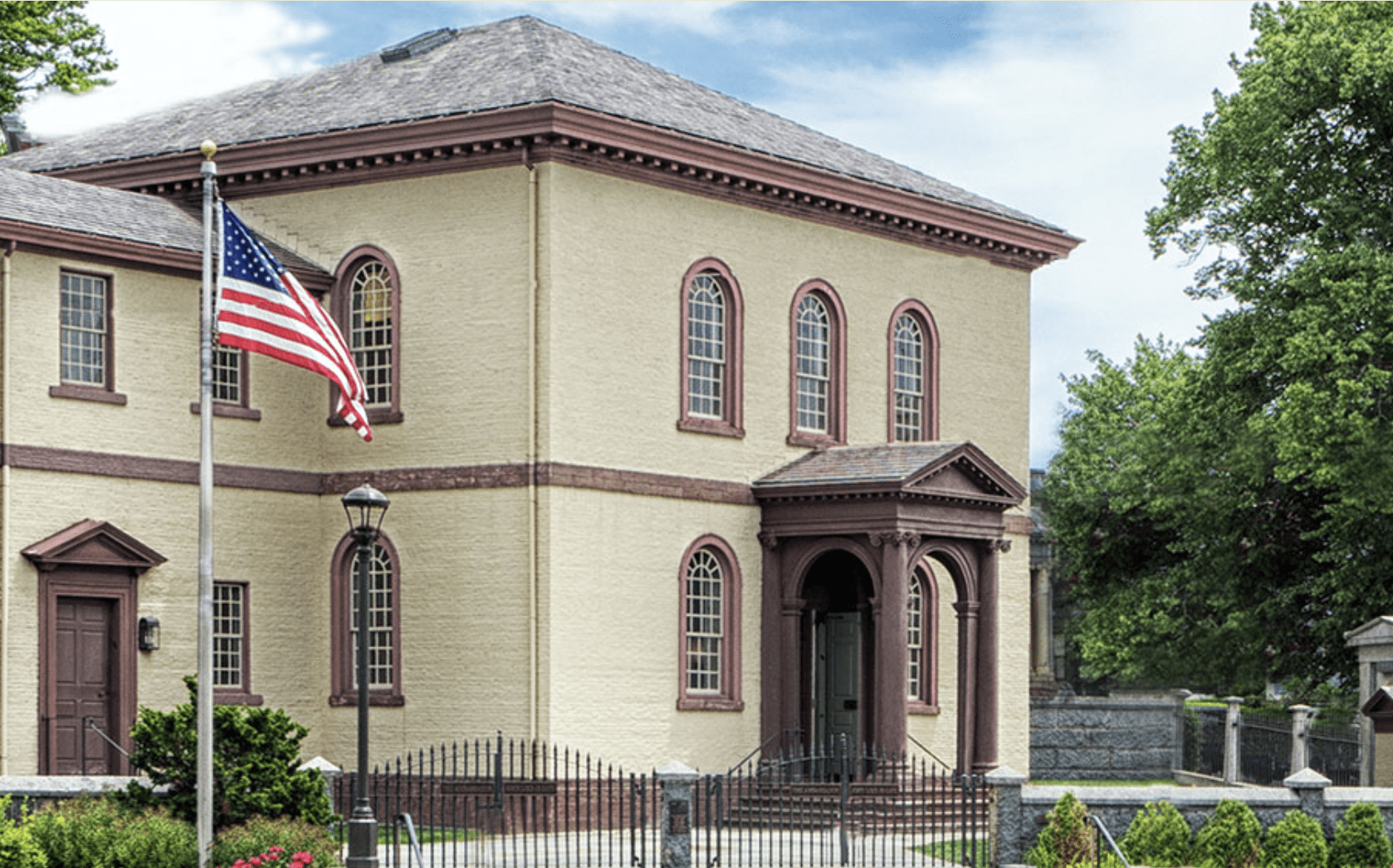
Providence College Jewish-Catholic Theological Exchange award from Touro Synagogue
77th reading of the George Washington Letter
The 77th annual reading of the George Washington Letter will be in Touro Synagogue on Sunday, August 18, 2024 at 1pm.
The Providence College Jewish-Catholic Theological Exchange will be presented with the Judge Alexander George Teitz Award, to be presented by Andrew Teitz, Vice Chair of the Touro Synagogue Foundation.
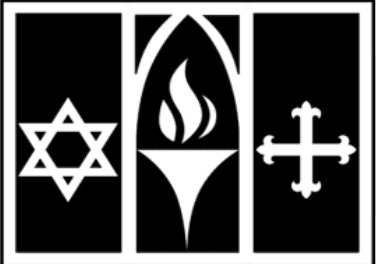
Receiving the award will be Theology and JCTE colleague Dr. Holly Taylor Coolman. Dr. Coolman is an assistant professor on faculty at Providence College since 2009 in the Theology Department, and was part of the initial organization of the Committee for Jewish-Catholic Theological Exchange.
In responding to RINewsToday’s request for comment, Arthur Urbano, PhD, Professor of Theology and Chair of the JCTE, said, “I’m deeply honored that Touro Synagogue, the nation’s oldest synagogue—older even than the United States itself—is honoring the Jewish-Catholic Theological Exchange committee. Touro stands as an important symbol of religious freedom and the ideals of positive interreligious encounter for Rhode Island and the entire nation. From its early history, Providence College has valued interfaith exchange and we’re proud to be part of a history linking our two institutions.
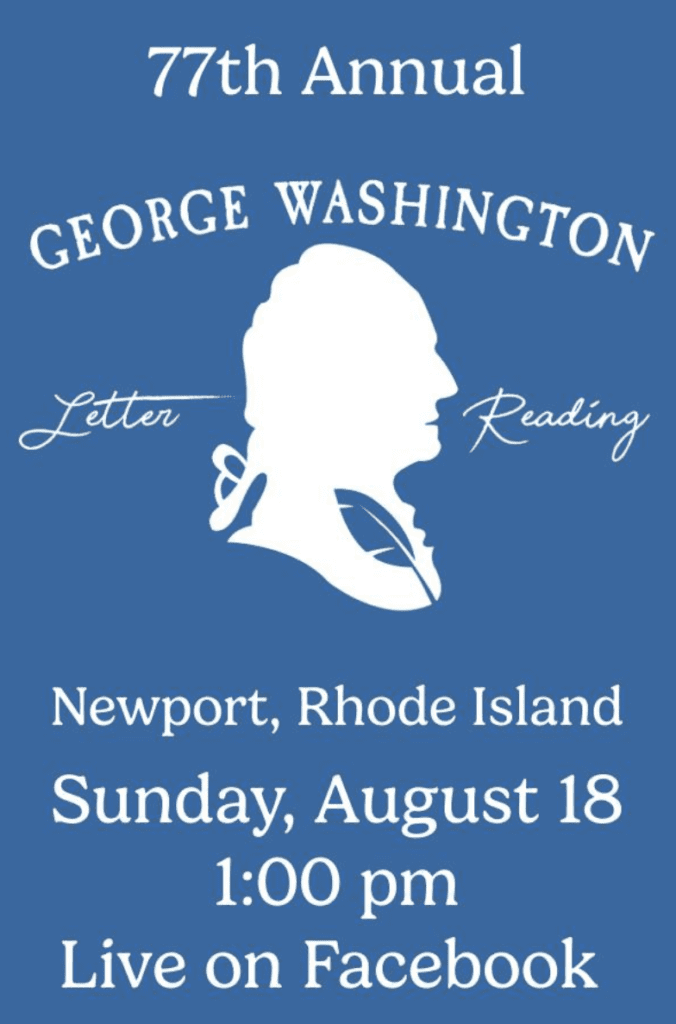
This year’s reader of the Washington Letter is Sharon Handler Loeb. Loeb practiced law at Coudert Brothers, worked for the European Economic Community, for Italy’s SCR public relations firm, and established an international consulting practice. Among her numerous philanthropic commitments, Sharon works with her husband, Ambassador John L. Loeb, Jr., to further the George Washington Institute for Religious Freedom’s mission “to help students, teachers, and the public worldwide to go beyond ‘mere’ toleration of our religious differences to sincere respect for each other’s beliefs and observances.”
Gregg Amore, Rhode Island Secretary of State, will read the Seixas letter.
Sian Leah Beilock, Dartmouth President, will deliver the keynote address.
While attendance is by reservation only, including a reception to follow on the grounds, the event will be live-streamed on the Facebook page: Touro Synagogue – Newport, RI.
Here is the program:
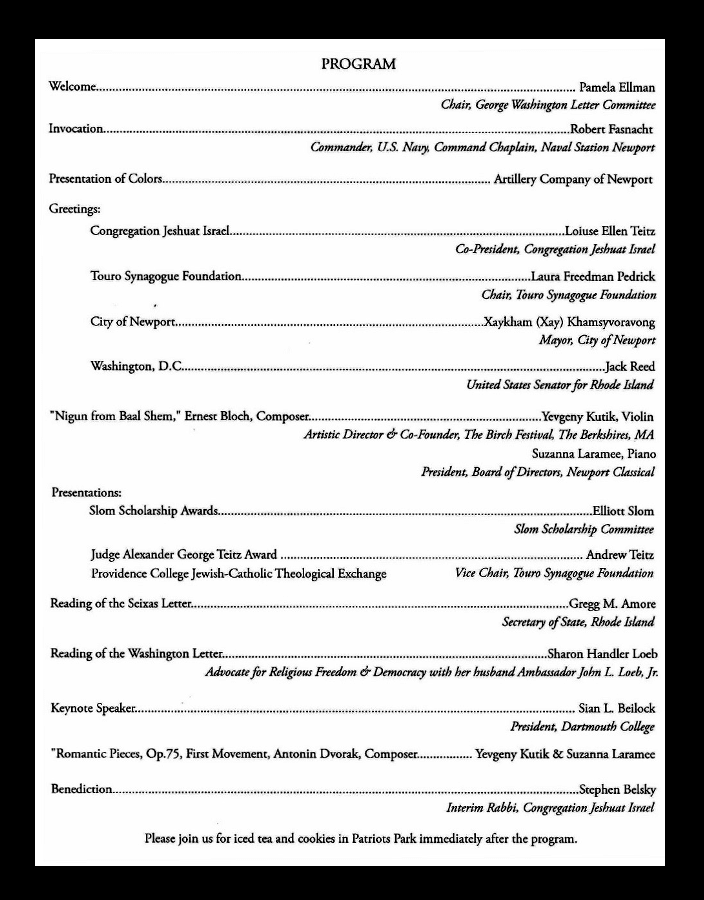
Honoring Religious Freedom
Every summer, the Touro Synagogue Foundation partners with Congregation Jeshuat Israel to host The George Washington Letter Reading, an event honoring our nation’s heritage of religious freedom. George Washington’s 1790 letter to “To the Hebrew Congregation in Newport” was written after his first trip to Rhode Island as President. In his eloquent reply to a letter written by Moses Seixas, warden of the local Jewish congregation, Washington attested to the new government’s commitment to freedom of religion, an entitlement he regarded as an “inherent natural right.” The federal government, he stated, “gives to bigotry no sanction, to persecution no assistance.”
The annual event has a long tradition of distinguished keynote speakers, and letter readers, including Supreme Court Justices Ruth Bader Ginsburg and Elena Kagan. The program includes presentations of the Judge Alexander George Teitz Award and the Aaron and Rita Slom Scholarship for Freedom and Diversity.
___
Washington’s Letter to the Jews of Newport, 1790
President George Washington’s letter to the Hebrew Congregation in Newport, Rhode Island, is relatively short in length, but its impact on American life is immense. In 340 well-chosen words, the letter reassured those who had fled religious tyranny that life in the new nation would be different, that religious “toleration” would give way to religious liberty, and that the government would not interfere with individuals in matters of conscience and belief. Quoting the Bible’s Old Testament, Washington wrote, every one shall sit in safety under his own vine and fig-tree and there shall be none to make him afraid.
He continues:
“For happily the Government of the United States gives to bigotry no sanction, to persecution no assistance, requires only that they who live under its protection should demean themselves as good citizens, in giving it on all occasions their effectual support.”
When he wrote this particular letter in August of 1790, the new President may have been aware of the effect it would have on the fledgling nation, but he could not have known the extent of its influence today. The history behind Washington’s letter gives a better understanding of the values of the early colonists and our Founding Fathers and showcases two fundamental tenets of American democracy: the separation of church and state and the right of individuals to believe in and practice their religion.
_
Newly elected President George Washington arrived in Newport, Rhode Island, on August 17, 1790. He traveled with Secretary of State Thomas Jefferson, Governor George Clinton of New York, U.S. Supreme Court Justice John Blair of Virginia, and U.S. Congressman William Loughton Smith of South Carolina.
Washington traveled to the New England states the previous fall “to acquire knowledge of the face of the Country the growth and Agriculture thereof and the temper and disposition of the Inhabitants towards the new government.” He deliberately bypassed Rhode Island because the state at that time was the only one not to have ratified the Constitution. There were several reasons for this reluctance to ratify. Most important to Rhode Island history today is that in its original form, the Constitution did not explicitly protect religious freedom, a core Rhode Island principle introduced by Roger Williams and protected in its 1663 Royal Charter.
Finally, with pressure mounting from some Rhode Island cities and the other states, on May 29, 1790, Rhode Island held a convention and ratified the Constitution. Now the President felt that a trip to the state to acknowledge the recent ratification and promote the passage of the Bill of Rights was prudent.
___
Providence College JCTE Mission
Since its founding in 1917, Providence College has actively promoted Catholic and Jewish engagement. Building on this history, the Jewish-Catholic Theological Exchange (JCTE) committee was established by the Theology Department in 2007 and has continued to extend opportunities for Jews and Christians to pursue “mutual understanding and respect which is the fruit, above all, of biblical and theological studies, as well as of fraternal dialogues” (Nostra Aetate 4). Reflecting on the common spiritual heritage as well as the unique identities of Jews and Christians, our mission is to foster interreligious learning, understanding, and friendship.
The JCTE hosts major lectures, colloquia, and other initiatives on the Providence College campus. These events provide a welcoming forum where members of the college join the broader Rhode Island community, to engage with local religious leaders and nationally recognized experts to discuss themes of mutual theological interest. In continuity with Providence College’s long-standing tradition, the JCTE promotes interreligious understanding and dialogue in the spirit of the Second Vatican Council’s Declaration on the Relation of the Church to Non-Christian Religions (Nostra Aetate).

